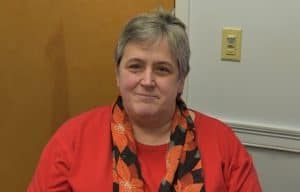An Action Plan for Recovery
 For Ada Landry, being a recovery coach is being “an advocate, cheerleader, and resource finder. Working with us, an individual can get around barriers in their recovery path.”
For Ada Landry, being a recovery coach is being “an advocate, cheerleader, and resource finder. Working with us, an individual can get around barriers in their recovery path.”
Landry firmly believes that the individual served should be able to relate to his or her recovery coach as an equal partner. “They shouldn’t view me as a professional who is above them and is telling them what to do,” she said. “I’m on the same level as them.”
Landry, a certified lactation counselor who has been at CHD for a year-and-a-half, has been in recovery since February 20, 2011. She pointed out that lived experience is what makes recovery coaching stand out—because it offers a bridge of understanding that can’t be replicated in professional training.
“If someone says to me, ‘Oh my, I got through Thanksgiving, and we went into my significant other’s family home, and they were having mimosas for brunch,’ I can speak from my experience on what she can do, and how she can plan for this kind of scenario in the future. Whereas, someone who doesn’t have lived experience with that can’t say, ‘This is what I did.’ So now this recoveree now has a game plan for Christmas morning. When the family’s getting together, she’s bringing in a fresh fruit juice cocktail for her and anyone else in the family who doesn’t want to drink alcohol at 10 o’clock in the morning.”
Some of the people Landry helps are people in long-term recovery who sense something missing in their recovery journey. “Maybe they’re feeling stagnant,” she said. “Maybe they’re feeling urges to drink or use other substances, and so their therapist might suggest—or the individual might have read about—recovery coaching.”
She said some recoverees have lost connection with a program that they used at first and want to reestablish it. For example, she coached a woman who was five years into her recovery, and wanted to go to AA, but was anxious about the prospect. “So that’s one of the things we did together: we went to an AA meeting,” said Landry. “She didn’t feel comfortable going by herself.” This led to the woman reconnecting with people she knew from early in her recovery, and she also received more supports for dealing with caring for a child and a grandmother with dementia. “On Wednesday nights, she and a friend go out to dinner together to bounce things off one another—and just be there for each other—in coping with the stress of life,” she said.
Landry, who earned her bachelor of science degree in human services from Cambridge College, said there isn’t a one-size-fits all solution to recovery, and part of her job is knowing about different paths to success—the most obvious are AA and NA, but there are also such organizations as LifeRing, which provides secular, non-12-step-based groups for people overcoming addiction, and Celebrate Recovery, a Christian recovery ministry. Some people want to use the 12-step method but seek additional tools.
Recovery coaches are more like life coaches than therapists because they help individuals set goals and create an action plan, “whether it’s going back to school, or changing a job they’re not happy with,” said Landry. The focus is not on past trauma—they will only talk about the past if the recoveree wants to. “If something is stressing them that borders on needing mental health supports, I’ll ask, ‘Have you talked to your therapist about this?’ Oh, you haven’t met with your therapist in a while? Is that something you want to do?’” she said.
A recovery coach typically meets with a recoveree in several different ways during the course of a month. “We’re on the phone, or going to a recovery meeting, or going to a food pantry—or maybe we’ll just take a walk in the park and talk about pieces they need in life that might help them in their recovery,” she said.
Referrals to CHD recovery coaching services can be made at 1-844-CHD-HELP.